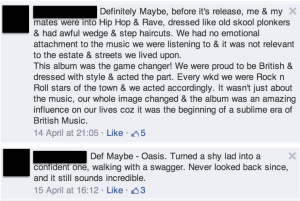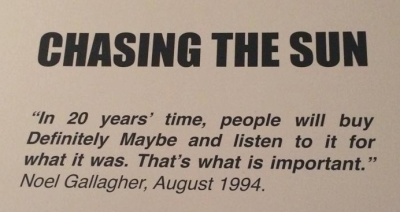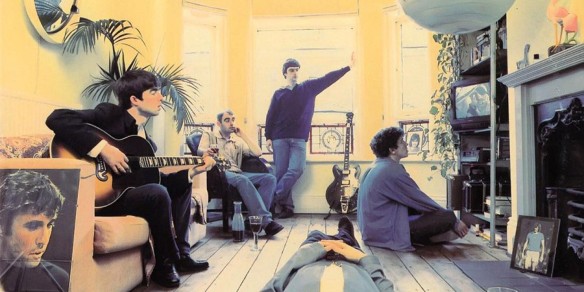
1994 produced two of my favourite albums: Nine Inch Nails’ The Downward Spiral and Manic Street Preachers’ Holy Bible. These dark, introverted records remain cornerstones in what I consider one of the best decades of music. However, there’s one record from 1994 that is receiving much attention lately, Oasis’ seminal-debut, Definitely Maybe.
Now I’ll admit – I’ve never been an Oasis fan. My allegiance has always been with Blur and I’ve always viewed the Gallagher Brothers with an ounce of contempt. I think they’re egotists – who spurt out more nonsensical guff that the average politician. That said, I can’t deny they wrote some good songs. Really good songs. And whilst I’ve been looking back at their discography; it’s difficult not to rate their first two records as highlights of the era.
Of course, Oasis followed a pretty chaotic trajectory. Many would agree that the band burned out after What’s The Story Morning Glory? – with Be Here Now often cited as one of the biggest disappointments of the 1990’s. In fact, that bloated and indulgent record is exactly why I’ve disliked the band in the past. A concoction of drugs, noise and the NME giving it a proverbial hand job under the table. But cynicism aside; Definitely Maybe was, and still is, an important record. It was the dawn of Britpop, New Labour, a new era – all in the run up to the millennium. Its impact was unprecedented – and its songs were even greater. This year marks it 20th anniversary (and bizarrely, 50 years since the British Invasion) so I’ve decided to revisit it anew to breakdown exactly why Definitely Maybe matters.
1. It was cool.
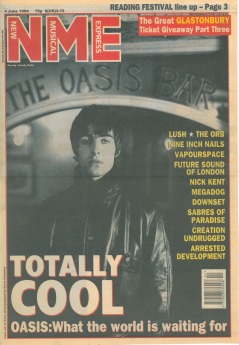 There’s something wonderfully punk about Definitely Maybe. Not only in its guitars and aesthetic – but in the way it didn’t give a shit about the existing norms. Similar to how the Sex Pistols countered the indulgence of prog-rock; there’s nothing pretentious about Definitely Maybe. (That’s more than can be said about the Gallagher Brothers, though)
There’s something wonderfully punk about Definitely Maybe. Not only in its guitars and aesthetic – but in the way it didn’t give a shit about the existing norms. Similar to how the Sex Pistols countered the indulgence of prog-rock; there’s nothing pretentious about Definitely Maybe. (That’s more than can be said about the Gallagher Brothers, though)
Consider how Noel talks about Supersonic:
‘I went in the back and wrote ‘Supersonic’ in about a half hour, recorded it the rest of the night. And that’s the rough mix, and
it was never remixed, either. A magical night, brilliant.’
It took half an hour to crack out one of the most iconic songs of the 1990s. Sure, the lyrics are meaningless and Gin and Tonic/Supersonic is hardly the most poetic rhyming couplet. But Definitely Maybe matters because it wasn’t caught up in the bullshit of trying to be cool, and that’s exactly why it remains so endearing.
2. It was counter-culture.
N oel Gallagher claims he wrote Live Forever whilst working on a building site, in what he considered a response to U.S Grunge.
oel Gallagher claims he wrote Live Forever whilst working on a building site, in what he considered a response to U.S Grunge.
‘Seems to me that here was a guy who had everything, and was miserable about it,” said Noel. “And we had fuck-all, and I still thought that getting up in the morning was the greatest fuckin’ thing ever.’
Live Forever may be a slightly crass title to challenge Nirvana’s I Hate Myself and I Want To Die – but it represents an important counterculture against U.S music. Noel’s lyrics were unmistakably British, and inspired an identity that was so absent in 1990’s music from across the pond.
Take Digsty’s Diner for example:
‘If you could come to mine for tea // I’ll give you strawberries and cream’
Woefully simple – but impeccably English. These lyrics encouraged a new sense British cultural identity – that coincided with the Cool Britannia and New Labour movements.
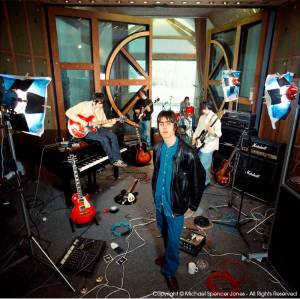 Likewise, the records’ stylistic elements harked back to a ‘golden era’ of Britain. Guitars, bass and drums – it’s unsurprising critics drew links to 60’s bands like The Who and The Kinks. Given that the late 1980s was ripe with electronic music (house, techno etc) – Definitely Maybe was a refreshing sound, regardless of how dated its style really was.
Likewise, the records’ stylistic elements harked back to a ‘golden era’ of Britain. Guitars, bass and drums – it’s unsurprising critics drew links to 60’s bands like The Who and The Kinks. Given that the late 1980s was ripe with electronic music (house, techno etc) – Definitely Maybe was a refreshing sound, regardless of how dated its style really was.
The record’s producer Owen Morris even considered it an attack on that 80’s music.
“I wanted to make the sound as heavy as possible, as I was frustrated with machines and dance music and wanted loud guitars, and luckily enough so did they”
Of course, John Squire and Ian Brown’s work half a decade before laid the foundation for this movement; but a war on ‘machines’ is exactly what Britpop embodied sonically. Ensuring that Rock and Roll would never die.
3. It meant a lot… to a lot of people.
Definitely Maybe matters because it connected with so many Brits. Those who were alienated by American rock and monotonous electronica wanted to hear music that resonated with them. Suddenly, the influx of ‘British lyrics’ about Manchurian life and daily observations was compelling. Definitely Maybe propelled the Britpop machine into affluence and in doing so revitalised British cultural identity.
Likewise, the records’ critical reception was unanimously positive. But an album can be much more than just a few good songs – and some of the best didn’t please the critics. Granted – my understanding of how Definitely Maybe affected people is somewhat dubious, as the record itself is before my time. Nevertheless, you only need to look at the comments NME’s ‘Albums that changed your life’ to gauge its impact:
‘This album was a game changer!’ – and it bloody well was.
4. It had some fantastic tunes
There’s no denying that Definitely Maybe has some tunes. Hell – the whole record could’ve been released as singles. If I were to compile a greatest hits of Oasis – no doubt most of the songs would come from their first two efforts.
Supersonic? Rock N Roll Star? Slide Away? Columbia?
Ultimately, Definitely Maybe is an important part of British Music History. Whilst I hate the romanticism that Oasis were consistently good (the denial that their whole career really bottles down to only two records) – there’s no avoiding the impact Definitely Maybe had to British culture. It paved the way for a musical movement and embodies a wonderful sense of national identify. Nevertheless, amidst the celebration of its anniversary, and its subsequent reissue – there are the inevitable talks of a reunion. Whether of not we’ll see remains to be seen. However, Definitely Maybe can stand on its own. I’m not an Oasis fan, and not particularly fussed about seeing them live. But I love this album, and so do a lot of people. Records are like great novels that stand the test of time, and can outshine any wrongdoing of their author. And for that reason – I’m willing to turn a blind eye to Be Here Now and Heathen Chemistry. Definitely Maybe has aged gracefully… and I can’t wait to see how she looks in another 20 years.

